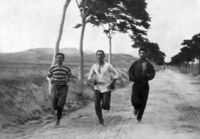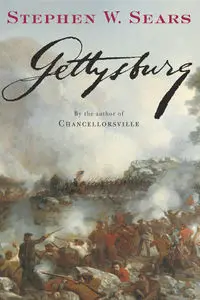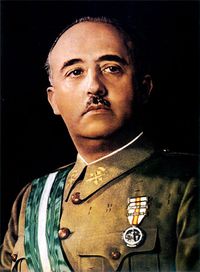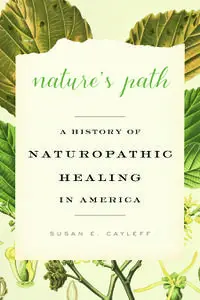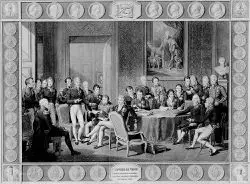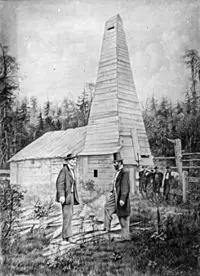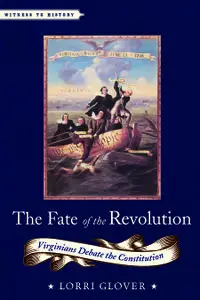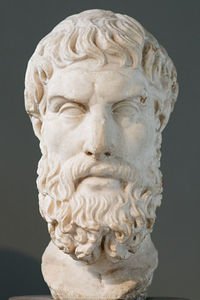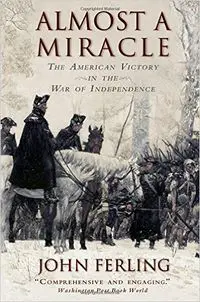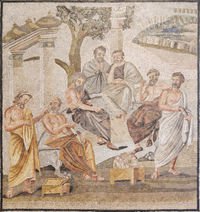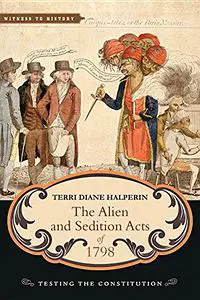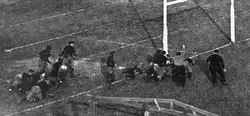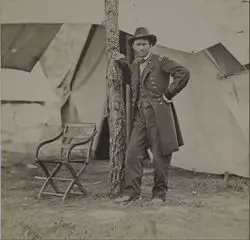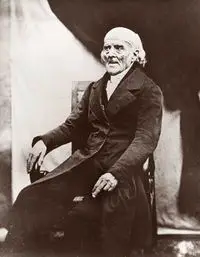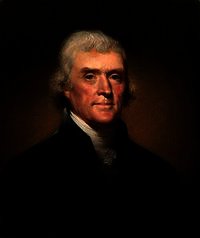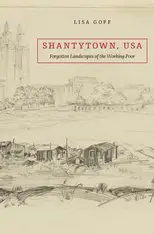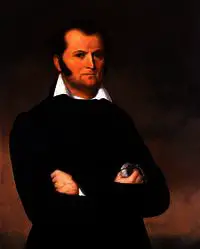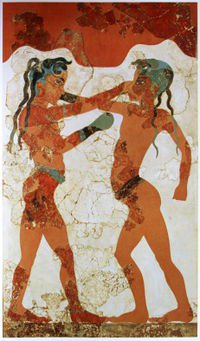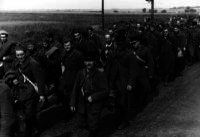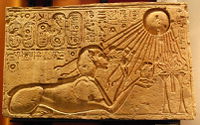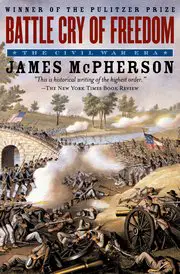Difference between revisions of "Main Page"
| Line 43: | Line 43: | ||
[[File:Congress_of_Vienna_1815.jpg|thumbnail|left|250px]] | [[File:Congress_of_Vienna_1815.jpg|thumbnail|left|250px]] | ||
==[[Why did the Congress of Vienna fail to stop future European wars?]]== | ==[[Why did the Congress of Vienna fail to stop future European wars?]]== | ||
| − | The Congress of Vienna was a gathering of representatives of European kingdoms that was presided over by the Austrian Chancellor Klemens Von Metternich. The Congress was held in Vienna from 1814 to 1815. The goals of the Congress were to secure peace and stability in Europe and to ensure that revolutions did not destabilize the Continent | + | The Congress of Vienna was a gathering of representatives of European kingdoms that was presided over by the Austrian Chancellor Klemens Von Metternich. The Congress was held in Vienna from 1814 to 1815. The goals of the Congress were to secure peace and stability in Europe and to ensure that revolutions did not destabilize the Continent. {{Read more|Why did the Congress of Vienna fail to stop future European wars?}} |
</div> | </div> | ||
Revision as of 21:19, 15 September 2016
American Surveillance: Interview with Anthony Gregory
The United States has been conducting surveillance of its citizens since it was created, but the ability of any government to spy on its citizens has dramatically improved in the digital age. How should United States balance national security and personal privacy? Does the Constitution provide adequate protection against unrestricted government surveillance? What can advocates do to strengthen personal privacy rights? These concerns will only intensify in the years to come. Read more...
How did the marathon emerge?
The marathon is seen today as grueling long-distance, usually over 26 mile race. The battle of Marathon, fought between the Greek and Persian armies, and the resulting run by a Greek warrior to tell the victory is usually cited as the origin of this sport. While there is truth in this story, the history of the marathon is complex and its presence in many major world cities shows it still stands as one of the great events that tests human will and skill. Read more...
Civil War Battles Top Ten Booklist
A DailyHistory.org top ten booklist focusing on best book on the battles of the American Civil War. The books on this list explore the battles of Antietam, Gettysburg, Chancellorsville, and many others. The list includes the works of several of the most prominent historians on this topic including James McPherson, Gordon Rhea, Stephen Sears and Craig Symonds. Take a look at our list.Read more...
What were the Root Causes of the Spanish Civil War?
Spain was a very divided, unstable and weak country in the 19th century. Once a great power, Spain lost almost the last of its colonies after it defeat in the Spanish-American war.[1] It was technically a monarchy, but power had frequently been in the hands of military dictators. The country was bitterly divided. The acute poverty of the Spanish people meant that many were drawn to Communism, Anarchism and Socialism. Read more...
Privateering during the War of 1812: Interview with Faye M. Kert
During the War 1812, US and Canadian privateers fought most of the naval battles between the United States and Great Britain. These privateers were comprised of captains who were motivated by the promise of profit to fight for their countries. There was a strong legal framework in both the United States and Great Britain that normalized piracy. Canadian and American ship owners and investors took advantage of it and funded privateering outfits during the war. Needless to say, privateers were incredibly risky investments.Read more...
Nature's Path: Interview with Susan E. Cayleff
At the very end of the 19th Century, a new system called naturopathy was created by Benedict and Louisa Stroebel Lust. Unlike many of the 19th Century medical systems created, naturopathy has persevered to this day. Naturopathic healing was founded and based on number of influences including botanics, hydrotherapy, eclecticism, temperance and vegetarianism. Read more...
Why did the Congress of Vienna fail to stop future European wars?
The Congress of Vienna was a gathering of representatives of European kingdoms that was presided over by the Austrian Chancellor Klemens Von Metternich. The Congress was held in Vienna from 1814 to 1815. The goals of the Congress were to secure peace and stability in Europe and to ensure that revolutions did not destabilize the Continent. Read more...
How did Edwin Drake create the World's first oil well?
Even though there was no one "first discover" of oil. Oil was known in antiquity when it was used to heal wounds. But by the middle of the 19th century methods for collecting oil from the ground had not changed for thousands of years. Edwin Drake's oil fundamentally changed this process and dramatically increased oil production around the world. Read more...
Fate of the Revolution: Interview with Lorri Glover
Starting in 1787, states began to ratify the newly drafted federal Constitution which would determine the fate of the new American Republic. In order for the Constitution to go in effect, nine of the states needed to agree to the document. While five states quickly ratified the Constitution between December 1787 and January 1788, the country's eyes stayed on Virginia. Virginia was the most populated and largest state and it was critical for the state to ratify the Constitution to legitimize the process. Read more...
Why was Epicurus and his philosophy so important?
Epicurus is often associated as one of the Greek philosophers more interested in pleasure or its pursuit than other ideals. While at times this led to a negative view of his philosophy, the reality is his thinking was very advanced and developed, leading to his ideas becoming highly influential in modern thought in many regions of the world today. He was one of the first Greek philosophers to develop a strong tradition that avoid superstition as a core ideal.Read more...
American Revolution Top Ten Booklist
On July 4, 1776, the Declaration of Independence was signed by the Continental Congress. This act was only the first step towards the creation of the United States. The United States then fought a seven year war to cement its independence from England. The successful fight for independence has had a remarkable impact on world history over the past 200 years. The United States gradually transformed itself from a former colony into a superpower. The impact of this revolution cannot be ignored. Read more...
What was Plato's academy and why did it influence Western thought?
The Academy, founded by the philosopher Plato in the early 4th century BCE, was perhaps one of the earliest institutions of higher learning. While it was not like a university where people would enroll and obtain advanced degrees, it functioned as one of the first places for dedicated research into scientific and philosophical questions, at least in Europe, took place by gathered scholars. Its main function was to teach Plato's philosophical understanding, but it also challenged its scholars to develop a new understanding of our universe. Read more...
The Alien and Sedition Acts of 1798: Interview with Terri Halperin
The Alien and Sedition Acts of 1798 were four laws that were passed by the predominantly Federalist Congress and signed by John Adams to strengthen the national security of the United States. These acts not only restricted the ability of an immigrant to become a citizen, but made it easier to deport non-citizens who were either deemed dangerous or were citizens of hostile countries. Perhaps the most contentious aspect of the new laws criminalized the printing or speaking allegedly false statements about the federal government. Not surprisingly, these laws were incredibly controversial and strongly opposed by Thomas Jefferson's opposition Democratic-Republican party.Read more...
Did Theodore Roosevelt really save Football?
In 1905, American football faced an crisis. Far to many young men were being killed while playing football and no one was taking any serious actions to reduce the risks. The headline at the top of the right hand column in The Chicago Sunday Tribune on November 26, 1905 screamed, "Football Year's Death Harvest - Record Shows That Nineteen Players Have Been Killed; One Hundred Thirty-seven Hurt - Two Are Slain Saturday."Read more...
Was the Destruction Perpetrated by Lincoln, Grant, and Sherman Necessary to End the Civil War?
January 1, 1863 marked a pivotal moment in the American Civil War. On this date the Emancipation Proclamation, the preliminary of which was issued by President Lincoln on September 22, 1862, took full and permanent effect, thus changing the Union’s ultimate war goal. The Civil War was no longer being fought to preserve the antebellum Union but rather, in the words of Lincoln, was to be a war of “subjugation…the [old] South” was to be destroyed in favor of “new propositions and ideas.”Read more...
Why did Germany lose the Battle of Stalingrad?
Hitler saw the war in terms of his personal rivalry with Stalin and he decided to attack the city, because of its symbolic value. However, the original aim of the offensive in Southern Russian was to secure the oil fields in the Caucasus. The oil was essential for the German war machine. Hitler knew this – instead of opting for concentrating all his forces on the conquest of the oil fields, he made perhaps a fateful mistake.Read more...
What was the dominant medical sect in the United States during the 19th Century?
Nineteenth-century medicine was characterized by constant competition among three major medical sects: Regulars, Eclectics, and Homeopaths.[1] Each of these medical sects not only meaningfully disagreed on how to treat illnesses and diseases, but sought to portray their type of practice as the most effective and scientific. Arguably none of the three sects was superior to the others, but their adherents concluded that their sectarian beliefs were better than their competitors.Read more...
Thomas Jefferson, the Founding Fathers and Christianity: Interview with Sam Haselby
Recently on Twitter, a debate broke out between Annette Gordon-Reed, Sam Haselby, and John Fea on the nature of Thomas Jefferson's religious beliefs. Instead of recreating the debate, it made more sense to contact one of the participants, Sam Haselby, whose recent book The Origins of American Religious Nationalism (published by Oxford University Press) examines how a conflict with Protestantism, in the decades following US independence transformed American national identity.Read more...
Engineering Victory during the Civil War: Interview with Thomas F. Army, Jr.
Logistics win wars. Logistics is the coordination of complex operations such as moving, housing and supplying troops and their equipment. War is the ultimate test of any logistician. During the Civil War, the Union troops fought almost the entire war in the South. Thomas F. Army, Jr. argues in his new book Engineering Victory: How Technology Won the Civil War published by Johns Hopkins University Press that the Union's engineering prowess during Civil War gave it an distinct advantage over the Confederacy.Read more...
Shantytown, USA: Interview with Lisa Goff
The Harvard University Press recently published Lisa Goff's new book Shantytown, USA: Forgotten Landscapes of the Working Poor. There's a chance that one of your American ancestors lived in an American shantytown. While we may not realize it now, shantytowns were a common feature of 19th century America. Goff's book explores not only how shantytowns became a prominent feature of America's towns and cities, but why middle class Americans eventually turned on them and their residents. Read more...
The Mysterious Illness of Jim Bowie: How Did He Contribute to His Own Decline?
Directly or indirectly, Jim Bowie’s enigmatic illness resulted from his own actions. A hearty man of six feet in height, Bowie was a walking contradiction; a slave trader who fought for freedom, a generous and congenial man who called out his thunderous temper on a whim, and a commanding leader who was prone to binges of sloppy drunkenness. Read more...
How did modern boxing emerge?
Boxing is one of the oldest sports known to us. From very early historical records, to its professional development in the last century, and modern prizefights, the sport has become a global phenomenon watched by millions. Although modern boxing has a lot of similarities with its ancient cousin, the mix with television, big money, and big personalities has forever changed the sport. Read more...
Alexander the Great Top Ten Booklist
Creating a top ten list for books on Alexander the Great is not easy, since few ancient historical figures have been written about as much. Everything from his complex personality and his sexual life to his military and logistical tactics have been analyzed by historians. Alexander, simply put, stands out as unique among ancient historical figures for having so much detailed assessment made on his life and times. Read more...
Was the Destruction Perpetrated by Lincoln, Grant, and Sherman Necessary to End the Civil War?
January 1, 1863 marked a pivotal moment in the American Civil War. On this date the Emancipation Proclamation, the preliminary of which was issued by President Lincoln on September 22, 1862, took full and permanent effect, thus changing the Union’s ultimate war goal. Once the aim of the war changed for the Union, so too did its leaders. The harsh and unpopular actions that were necessary to prevent the prolonged bloody carnage of continual war were tasked to three men: Abraham Lincoln, Ulysses S. Grant, and William T. Sherman. Read more...
Why was France defeated in 1940?
In September 1939, the Nazi War Machine invaded Poland and World War II began. France and its Britain declared against Nazi Germany in 1939. The French army was in theory as strong as the Germanys and it had a vast Empire and a sophisticated arms industry. It had also established a series of fortifications in the east of the country, known as the Maginot Line. The Line was designed to keep German forces out of France. Read more...
How did Monotheism Develop?
While monotheism is seen as something that has derived from Judaism, the history of how monotheism became pervasive is complex. Integrating both historical and archaeological data, we find that the rise of monotheism has been influenced by key political events. These political events help transform not just these early monotheistic faiths but also by extension many parts of the world today.Read more...
Gilded Age/Progressive Era History Top Ten Booklist
Creating a Top Ten List for the Gilded Age/Progressive Era is challenging. There are an extraordinary number of outstanding books on this period. These books are a selection of our favorites. Most of these books are focused on trying to define this era as whole, instead of focusing on a single issue. In other words, several of these books are seeking to create a grand narrative of the era to help their readers understand it. Read more...
The Best Historians and Books According to James McPherson
In 2014, the New York Times published a brief interview with noted Civil War historian James McPherson, The George Henry Davis 1886 Professor of American History at Princeton University. McPherson is considered to be the dean of Civil War historians. He is best known for his Pulitzer Prize winning book Battle Cry of Freedom which is the best overview of the Civil War. Read more...
Articles
Here are some of our most recently created and edited articles.
- Why did the United States start the Mexican American War
- What Caused The Economic Panic Of 1837
- Why did Andrew Jackson want to destroy the Bank of the United States
- Why did the United States begin directly electing Senators in 1913
- How did Mussolini Rise to Power as the Dictator of Italy
- Why did Germany lose the Battle of Stalingrad
- What were Joseph Stalin's goals as World War Two ended
- How historically accurate is the Gladiator
Interviews
These are our interviews with historians discussing their new books.
- Make It Rain: Interview with Kristine C. Harper
- American Girls in Red Russia: Interview with Julia Mickenberg
- Inventing the Pinkertons: Interview with Paul O'Hara
- Primed for Violence in Interwar Poland: Interview with Paul Brykczynski
- American Surveillance: Interview with Anthony Gregory
- Privateering during the War of 1812: Interview with Faye M. Kert
- Nature's Path: Interview with Susan E. Cayleff
Booklists
Includes our most recent Expert and User created Top Ten History Booklists.
- Top Ten Books on Napoleon Bonaparte
- Top Ten Books on Los Angeles History
- Top Ten Books on the History of Reconstruction
- Top Ten Books on the Bubonic Plague
- Top Ten Books on The Medici Family during the Renaissance
- Top Ten Books on Julius Caesar
- Top Ten Books from the Oxford Battle Series
- Top Ten Booklist on Joseph Stalin
- Great Gifts for History Lovers 2018
- Top Ten History of Voting Rights Booklist
- New Kingdom Ancient Egypt Top Ten Booklist
- Ancient Egypt’s Third Intermediate and Late Periods Top Ten Booklist
- Top Ten War Books that were turned into Movies
- Great Gifts for History Lovers 2017
- Ten Essential Books Pertaining to the Holocaust
Blog Roll
Here are some links to our Favorite History and Academic Publisher Blogs
- Tropics of Meta
- Nursing Clio
- The Junto
- Points: The Blog of the Alcohol and Drugs History Society
- Process: A Blog for American History
- Legal History Blog
- Balkinization
- Cooking in the Archives
- We're History
- Real Clear History
- History News Network
- National Museum of American History
- Oxford University Press Blog
- Johns Hopkins University Press Blog
Contribute
DailyHistory.org is a communitiy history wiki. Almost every page (excluding interviews and expert booklists) can be edited. You are welcome to join us.
- Every article answers a historical question and every booklist is a Top ten list.
- After you register, you will be able to edit and create articles.
- All of your contributions need to be original.
- If you want to create a new page, you can easily do so by using the following form:
Categories
Below you can find the category structure of the wiki, as well as the pages within each category.
Please like Dailyhistory.org's Facebook, Twitter, and Google+ pages or follow us on our DailyHistory.org blog.

